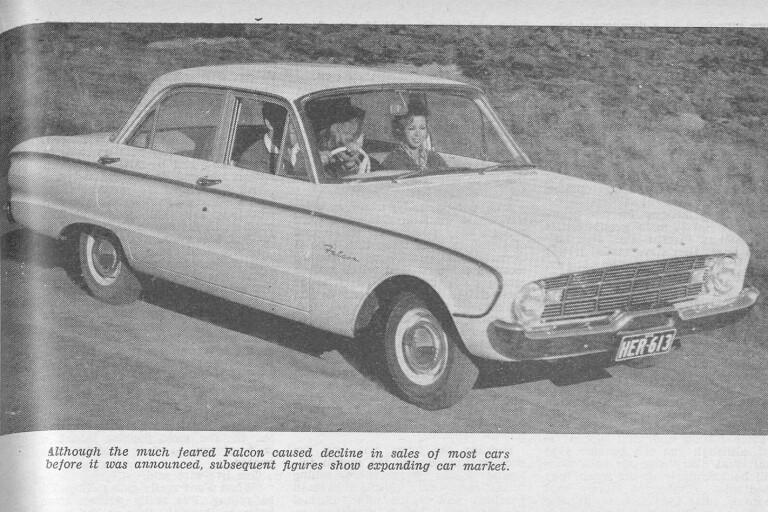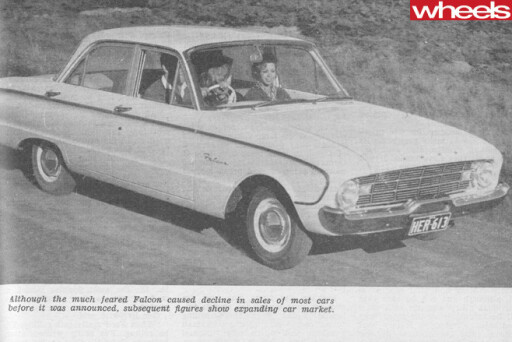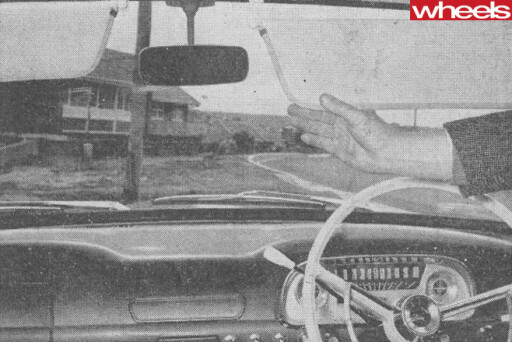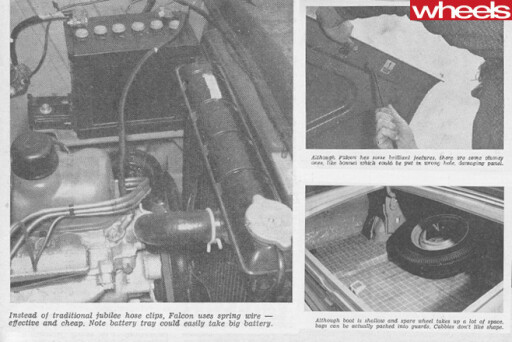
In spite of the gloom which settled over the motor trade just before the Falcon was released, the main result to date has been to expand the car market.
First published in the January 1961 issue of Wheels magazine, Australia's best car mag since 1953.
"The tumult and the shouting dies, The Captains and the Kings depart O'er leagues of land The Falcon flies, The battle's joined of salesmen's art."
WITH apologies to the author. But true, the wreathing dust of battle descends after the shindig of the Ford Falcon release. As the parties in the fray become visible once more we can see at things have changed and that the Australian motoring scene will probably never be the same again.
Places like the showroom-huddled speedway, Sydney's William Street, look externally as before. But there has been a strong new force added to the car market which could be the first since the Volkswagen invasion to have a real impact on motorists' buying.
Like the fall-out from an atomic bomb, the dust of Ford Falcon's rise from its launching pad has settled everywhere. Some has drifted over the showrooms of GM-H distributors, obscuring - temporarily - the glittering new Holdens inside. Some has settled on the smaller-car display centres. A little has got into the noses of salesmen selling behemoths, with some left over for those pushing quality, specialist cars. It's even spread to speedboat and TV shops.
For nothing sells like a new popular-appeal car, and it's been a long time since there was some new family-business transport about. The effect of the Ford Falcon has accordingly spread everywhere, and not a car salesman in Australia can truthfully say that his sales have not been tied up, delayed or even lost outright to Falcon.
As a result, the brooms are out all around. In particular, salesmen in Holden showrooms are sweeping vigorously. As one Ford sales rep acidly put it:
"Those blokes up the street will have to sweat like the rest of us have been doing."
However, the Holden salesmen – to a man – are playing mum and showing a very stiff upper lip.
They say off the record that they've got nothing to worry about. They could be right at that. Statistics indicate that the exploding market for cars in Australia promises such demand for this class of car that Holden, even with its recently announced expansion program, may not have been able to fill every order in the next few years unless Ford had released the Falcon to relieve the pressure.
So there is solid ground for the attitude in Holden showrooms today:
"There's plenty of room for two of us."
"We welcome competition."
"Ford make a good car."
But on an executive level, the reply to all questions is: No comment! No comment! NO COMMENT!
However, no matter how obvious the direct tussle between the two, one popular misconception should be laid flat.
 Ford did not produce the Falcon with the intention of knocking GM-H off its perch- despite all the talk in the newspapers about "battle", "retaliation" and so on.
Ford did not produce the Falcon with the intention of knocking GM-H off its perch- despite all the talk in the newspapers about "battle", "retaliation" and so on.
(One Sydney newspaper made a real splurge of this. And when, in a story supported by a flamboyant poster, they said that GM-H would probably produce the Corvair here as an answer to the Falcon's challenge, I felt a twinge of sympathy for the GM-H executives who have to read, digest and report on this flim-flam to their superiors in Detroit.)
No, Ford is not after scalps. Sure, Australians, being perverse, agin-the-guvverment crowd, are inclined to be cheering Falcon on because Ford has been the underdog. If the roles were suddenly reversed public opinion would switch as well!
Ford is in business for one primary reason - to make profits on its shareholders' investments. Just how much profit they have made, or will make, is unlikely to be known, because Ford would be understandably reluctant to divert some of the annual outcry against the profits of foreign-owned companies, now directed exclusively against GM-H, on to its own head.
However, business depends on profits and Ford have produced the Falcon to increase their share. Their aim is not to "hurt" GM-H. Far better business can be done - if the lion who feigns sleep is not officially awakened.
Price cutting and mud slinging is out, although you can be sure that individual distributors on both sides will be loading trade-ins when they need sales. But on a factory level there is little likelihood of a price war, because that would make both Ford and the General Motors Corp. wish they had stayed home. In fact, Ford probably hopes that the market expands fast enough to keep Holden sales healthy as well as their own.
On the Holden side of the fence, they are well aware that if they cut prices, notwithstanding any long-range results, the loss to them will be three times as great as it will be to the newer competition, because even if Ford sales go as anticipated they will be outselling Falcon three to one for quite some time.
And, paradoxically, a severe price war would discredit General Motors because they would then be accused of trying to stifle competition! So if General Motors make any downward move in price, or hold prices against others going up, it is likely to be small indeed, an "adjustment" to add a finer edge to their sales sword. And, of course, a price drop would sweep everyone else off the market which the Government would hate.
On the other hand, no matter how much the giants avoid a direct clash on a top level, they will clash, and are doing so now, on the sales floor.
As a result the salesmen are working hard, and the repercussions have been felt all around.
Perhaps the firms who had the stickiest time during the month following F-day were those selling "class" cars – cars which sell in small numbers and which offer unusual specifications, better performance perhaps, more luxury than in ordinary cars, something "different" all round
This month the buyers of this type of car tended to be diverted to the Falcon. One sales manager who sells in the vicinity of 20 specialist cars a month admitted losing four of his sales to Ford. But, he said, he wouldn't lose them when the first, freshness had worn off the Falcon and would probably pick up sales to people who had been waiting for a Falcon and had decided against it.
"All the same," he rasped, "there isn't a salesman in Australia who can truthfully say that he hasn't lost business in the over-a-thousand field to Ford this month."
In the Ford camp, there are more pink clouds than cars. There's no doubt that the Falcon has revitalised the enthusiasm of the Ford organisation from top to bottom, and no matter what way you look at it that's a good thing for motoring.
Surprisingly, many of the salesmen on the floor were losing money at the time of writing. Usual thing on Falcons is a base salary of £20, plus a company car, plus £5 per sale. A good man will sell a car a day. But selling them is not the problem at the moment. It's a matter of getting deliveries.
On the most popular model, a wait of up to four months was quoted.
One live-wire said: "When Ford really gets rolling, I’ll be rolling. I've really written some business. But until they do, my earnings are down. No deliveries, no commission.
"We're holding between 500 and 600 orders so far with deposits on the line. We've delivered less than 200 cars."
 This salesman is from one of the big Sydney Ford dealers. The biggest dealer of all is, according to rumour, holding 800 orders, although they will drop as deliveries start to roll out.
This salesman is from one of the big Sydney Ford dealers. The biggest dealer of all is, according to rumour, holding 800 orders, although they will drop as deliveries start to roll out.
All these orders have a deposit attached, and the money is placed in a trust account. Incidentally, deposits are invariably returned to the motorist if he decides not to go ahead with his purchase.
Despite the big backlog in deliveries, the newness, freshness and thrill of having something a bit different is making things easy for Ford to keep up the sales volume.
"People want something a bit different," said one. "The Holden owners who've been in here say one of two things. Either they had an FE or FC, liked it, but don't like the new FB, and feel the Falcon is more their car; or else they just want a change.
"They are invariably satisfied with the mechanical quality of Holden and reckon it's a good car.
"However, my impression is that they generally prefer the FC and are inclined not to be happy with the FB. It's a bit flashy, and that wraparound screen doesn't seem to have gone over as expected.
"My theory is that all the stories we've heard over the last couple of years about the excesses of the American car have been soaked up by motorists here. People are definitely after the cleanly-styled, good-looking car. And everyone will admit that Falcon is a good-looker."
Ford, though, is not content with picking up drift-aways from other makes. They are actively selling the advantages and virtues of their product. From a salesman's point of view their story is a good one. Fuel economy is well to the front. Owners are backing up salesman's claims, too. Sure, they have the advantage of new cars being driven at run-in speeds. But higher compression ratio and a design of cylinder head and manifolding incorporating later thought than the 15-year-old Holden engine seems certain to show a definite gain over the Holden in economy. Ignoring the wilder claims, it seems likely that the average Falcon owner will get 27 to 30 mpg on commuting driving, which is probably 10 to 15 percent better than the equivalent Holden mileage.
Some road tests show a 20 percent increase, which is somewhat higher than a comparison of specification figures would suggest.
However, pointed out a Holden salesman, Australia's own will happily burn standard gas and Fords must use super. The threepence a gallon difference is still a nice card in GM's sleeve and helps to nullify the sales advantage.
"Anyway," said this Holden man, "I'm not comparing the two cars. We don't knock the other product. But more motorists realise today – especially the ones who use a car for business and have it set out for them in black and white by their accountant - that petrol is the cheapest part of running a car. Running a new Holden or Falcon will cost £8 to £10 a week. Petrol will probably account for only £2/10/- of that.”
Bit silly to worry about a 5/- difference in your petrol bill - or 2/- if you allow for the difference in super and standard.
It seems taken for granted that the Falcon will cost approximately as much as the Holden to maintain. Resale value is a doubtful quantity at this stage, but there seems to be no reason, after the establishment period has passed, why it should not be as good as the competition. But there have been surprises before, and it won't be until the early birds – or the birds in early trouble – start selling their new-used Falcons that any sort of price structure will be established. And you can be sure that Ford distributors will bid up big for the first Falcons to come up at auction to prevent any sort of early price slump setting a precedent for the future.
Maintenance is being sold by Ford salesmen as one of its virtues. It has been designed as a simple car so that the customer could get as much car for the money as possible. As a result, the simplest mechanical solutions have been adopted wherever possible. Even the radiator hose clips, traditionally a screw-type clip with a worm screw, are replaced by bits of spring wire; the steering linkage is ingeniously sorted out to combine the simplicity of the asymmetrical track rod layout with the straight-running properties of the symmetrical types. The spring-supported bonnet has given way to a stay type, on the theory that it will annoy nobody but service station attendants.
(One such lugubriously hoisted the heavy bonnet into the air, unflipped the stay, and showed us how that an inattentive or lazy attendant could drop the bonnet on the stay in the wrong hole, thus denting the skin of the bonnet from the inside.
Maintenance is important to the taxi market, and both sides have their eye on this field. Taxi drivers are often surprisingly perceptive in their criticism and aren't loath to pass on their views to their passengers.
 Hence, sell the taxi driver and you sell the motorists. However, taxi owners, who you see far less of, may take a different view. Short of asking every owner and driver in the country, we can only drop these scattered opinions in the pool as being fairly representative.
Hence, sell the taxi driver and you sell the motorists. However, taxi owners, who you see far less of, may take a different view. Short of asking every owner and driver in the country, we can only drop these scattered opinions in the pool as being fairly representative.
"The boys aren't going wild over the Falcon. Why should we?"
"How are we going to travel three in the front with that great hump in the middle of the floor?"
"They reckon that the boot holds more luggage. Well, it looks too shallow to me to hold the odd loads we get."
"You tried turning her around in a narrow street? Well, you wind all day and nothing much happens, and on top of that the turning circle is 38ft. Not good enough for me, mate."
We also heard a couple of drivers criticise the low build, but admitted that they hadn't much grounds except that it looked awkward to get in and out of. (However, most reports say that it isn't difficult to get in or out.)
On looks, which, providing it doesn't look too different, don't matter much to a taxi driver, the Falcon probably scores, even if only on account of its ordinary windscreen.
The wrap-around screen of the FB was criticised by several of the drivers we spoke to.
Petrol consumption is very important to a cabbie. The best-documented report came to us from an owner of two Falcons, which, against his log books, were turning in 28 mpg. That should be enough to bring a smile to the face of the flintiest owner.
What about private owners? Universally happy, as far as we can tell. There have been no mechanical bugs which we can put our fingers on (judging from the reports we have heard, that is) and performance has been up to expectations. Sealing is a problem with any modem car, and owners are reporting water leaks in the front compartment. But Ford hasn't got it on its own in that department.
The steering is still a question mark right through. There is no doubt that, early on, many top distributor executives spent a lot of time worrying whether, in fact, Ford had boobed in this department and whether they would strike sales resistance because of it. The press were solidly against it and all who drive the car are conscious that you turn the wheel a long time before much happens. The salesmen say that customers coming back for service say "they will have to get used to it".
One Ford distributor executive said that the steering was exactly the same as all current American cars, that Ford knew what they were doing and that he had confidence in the factory's judgment. And he underlined the fact that he hadn't lost any sales because of it.
That perhaps, is about the only inconclusive note in the Falcon story, and is about the only feature of the car which is not in tune with current Australian thought.

COMMENTS